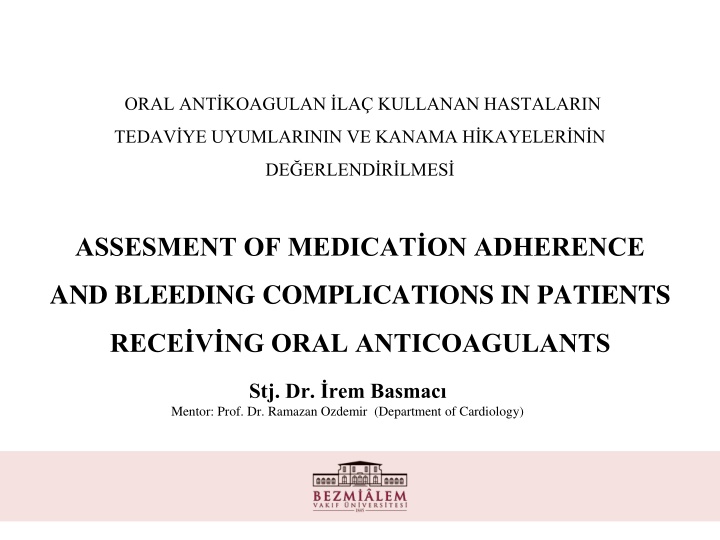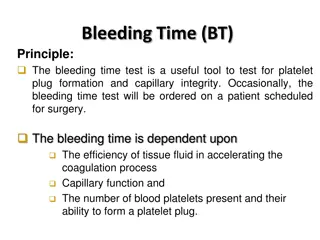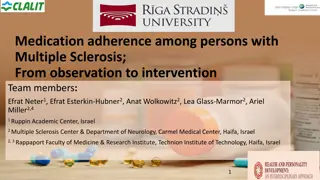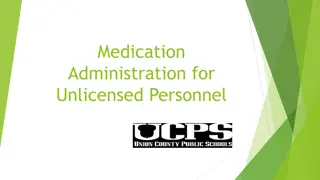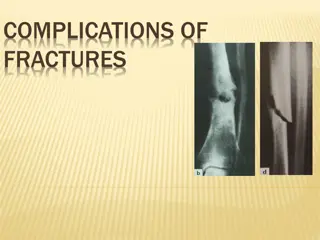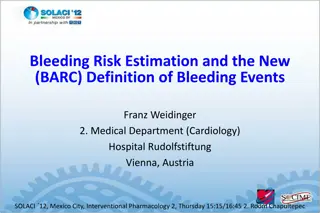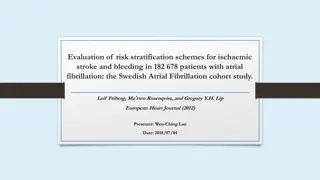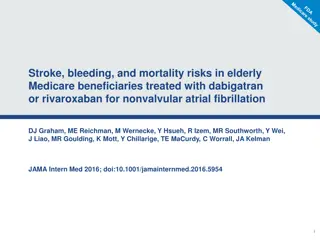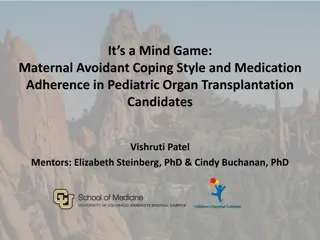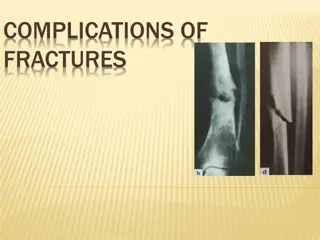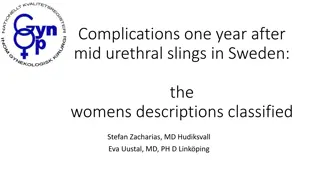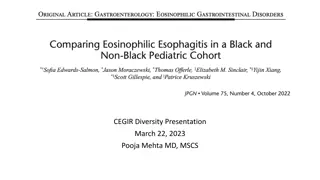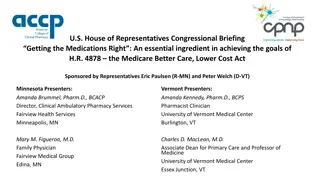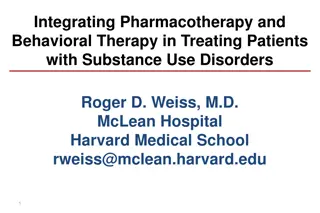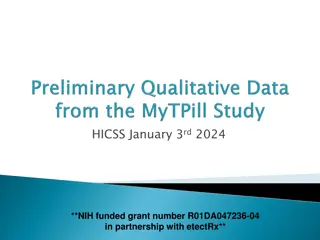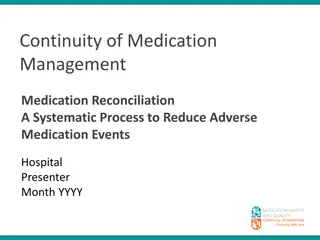Assessment of Medication Adherence and Bleeding Complications in Anticoagulant Patients
Oral anticoagulant drugs are commonly used in cardiology to prevent thromboembolism. This study assesses patient adherence, knowledge, and bleeding histories related to oral anticoagulants, including VKAs and NOACs. The aim is to understand treatment adherence and identify potential bleeding risks in patients receiving oral anticoagulants.
Download Presentation

Please find below an Image/Link to download the presentation.
The content on the website is provided AS IS for your information and personal use only. It may not be sold, licensed, or shared on other websites without obtaining consent from the author.If you encounter any issues during the download, it is possible that the publisher has removed the file from their server.
You are allowed to download the files provided on this website for personal or commercial use, subject to the condition that they are used lawfully. All files are the property of their respective owners.
The content on the website is provided AS IS for your information and personal use only. It may not be sold, licensed, or shared on other websites without obtaining consent from the author.
E N D
Presentation Transcript
ORAL ANTKOAGULAN LA KULLANAN HASTALARIN TEDAV YE UYUMLARININ VE KANAMA H KAYELER N N DE ERLEND R LMES ASSESMENT OF MEDICAT ON ADHERENCE AND BLEEDING COMPLICATIONS IN PATIENTS RECE V NG ORAL ANTICOAGULANTS Stj. Dr. rem Basmac Mentor: Prof. Dr. Ramazan Ozdemir (Department of Cardiology)
Introduction Oral anticoagulant drugs are common used drugs in cardiology clinics to prevent thromboembolism. New Oral Anticoagulants rivaroxaban apixaban edoxaban dabigatran Vitamin K Antagonists warfarin VKAs have been used for a long time but they have several limitations such as drug interactions, narrow therapeutic window, drug-food interactions, need for close INR (international normalized ratio) measurements. NOACs (Novel oral anticoagulants) are shown to be non-inferior to warfarin in the prevention of thromboembolism and even have better safety profile.
Most common and very important side effect of oral anticogulant drugs is bleeding. The bleeding can be major or minor. Major bleedings can be mortal. Major bleedings: intracranial, retroperitoneal, massive gastrointestinal bleedings and bleed with hemodynamic instability. Minor bleedings: epistaxis, uncomplicated soft tissue, superficial skin bleedings. The aim of our studyis to assess patient s anticoagulant drug treatment adherences, level of the knowledges about their drugs and their drug induced bleeding histories.
material-method Patients recruited for this study were randomly selected from the list of patients using oral anticoagulants with cardiologic endication in Bezmialem Hospital Cardiology Clinic. Anticoagulation therapy adherence and knowledge levels was assessed using the 6-item Modified Morisky Medication Adherence Scale (MMAS) . Patient demographics and some informations about their medical history were evaluated.
High Knowledge: High Adherence: kendimi iyi hissetti imde ilac b rakmam. +1 ilac m almay unutmam +1 kendimi k t hissetti imde ilaca ba l oldu unu d nmem. +1 ilac m her g n zaman nda al r m +1 ilac neden kulland m biliyorum. +1 ilac m yazd rmay unutmam +1
135 patients completed the survey. (VKA: 68, NOAC: 67) Age: Mean age of 135 patients included in the study was 66,51. Gender: Of all patients 34% of male. Education: 88% of all patients under the high school education degree. Other drugs: 46 %of all patients use 3+ drugs. 73%of all patients have comorbidities. (hypertension, diabetes, obesity, heart and kidney diseases etc.)
Among the patients, 86% showed high adherence to medication with MMAS-8 score, 14% 86% 24% 116 patient high adherence low adherence 76% 102 patient high knowledge low knowledge 76% showed high knowledge levels with MMAS-8 score.
minor bleeding major bleeding no bleeding 30% of the patients had history of minor bleeding (gum, nose and subcutaneous bleeding) while using 30 % anticoagulants, 5% of the patients had history of major bleeding. 65 % 5% There is no relationship between adherence and knowledge levels and bleeding histories of patients. (p>0.05)
under high school education level upper high school level all the patients who are upper high school levels have high knowledge 12% levels and high adherence. There is significant relationship 88% between adherence and knowledge levels and education levels of patients. (p<0.05)
Conclusion: As we have seen in our study, the majority of patients taking oral anticoagulants had high adherence and knowledge levels. They were satisfied with their anticoagulation therapy.
Assesment Of Medication Adherence And Bleeding Complications In Patients Receiving Oral Anticoagulants rem Basmac 1, Ramazan zdemir2 1Bezmialem Vak f University Faculty Of Medicine, Istanbul, Turkey 2Bezmialem Vak f University Faculty Of Medicine, Department Of Cardiology, Istanbul, Turkey Introduction: Oral anticoagulants (VKAs and NOACs) are common used drugs in cardiology clinics. Most common side effect of anticogulants is bleeding. The aim of this study is to assess patient s anticoagulant drug treatment adherence, level of the knowledge and drug Method: Patients recruited for this study were randomly selected from the list of patients using oral anticoagulants with cardiologic endication in Bezmialem Hospital Cardiology Clinic. Anticoagulation therapy adherence andknowledge levels was assessed using th Results: 135 patients completed the survey: 50% were on VKAs and 50% on NOACs. Mean age of 135 patients included in the study was 66,51. Of all patients 34% of male. Among the patients, 86% showed high adherence to medication MMAS Conclusion: As we have seen in our study, the majority of patients taking oral anticoagulants had high adherence and knowledge levels. They were satisfied with their anticoagulation therapy. Key Words: oral anticoagulant therapy, bleeding, drug adherence.
